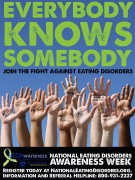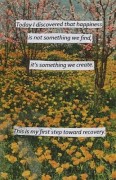NEDA Week 2012: Everybody Knows Somebody (Part 2)
I struggled not to cry as each picture, depicting life and love and happiness, flashed on the screen during Thursday night's National Eating Disorders Awareness (NEDA) Week presentation. I thought about all the people I know who are struggling with an eating disorder; the friends who have made it through recovery and the two people who recently lost their lives to their eating disorders.
Then I thought about myself and all the years I was being a slave to the scale, to weight and calories and inches, watching as I was diminished by anorexia until I almost died from it. And I wondered why I wasted all those years, but then I remembered that no one chosen to have an eating disorder; that these illnesses are, in fact, addictive coping mechanisms that run deeper than disordered relationships with food.
However, knowing that doesn't make it any less painful.
Remembering Those Who Lost Their Lives
Two people I knew lost their lives to their eating disorders. The first person was a good friend, Annemarie, and the second person was an unusual man who I met while in inpatient this past December.
Annemarie was the pure essence of life. She enjoyed hanging out with friends and drinking coffee, listening to her beloved Grateful Dead, and dressing up as a young hippie in bell bottoms, concert T-shirts, and the like. She loved to travel and meet new people, and she continued to do so almost until the day she died.
Annemarie and I met during my first inpatient stay for treatment of my anorexia. Inpatient is a microcosm of the real world, complete with cliques and all the competitiveness that comes with that. We didn't get along at first, and actually got into an argument during breakfast one morning which ended with me crying and her slamming her tray onto the floor. Sometimes emotions bubble over during treatment for an eating disorder, and things like that can happen.
However, we soon became good friends and started sharing our struggles and hopes with each other. Annemarie was very positive about my recovery from anorexia, telling me that I was going to be our doctor's — we shared the same doctor — success story. I have been gratified by her belief in me, even though I relapsed several times and went on to have seven additional inpatient admissions for my eating disorder and related anxiety and depression.
Annemarie fought to live, but her body was too worn out and damaged from years of anorexia. We had our last in-depth conversation on New Year's Eve 2010, after my husband had left me and moved to Florida. She begged me to get better and then told me that hospice was coming in to care for her. Her condition rapidly deteriorated after that, and she died in November. I was struggling with both restrictive eating and alcoholism at the time, and I still regret that I was unable to attend her funeral.
I met JH during my last inpatient hospitalization. He was unusual in several ways. He hated needles, but was covered with what seemed like a million tattoos. He was a male who had been struggling with bulimia and substance abuse for several decades. Unfortunately, this is becoming less uncommon as more males develop eating disorders. I also suspect that the number of males with eating disorders is most likely higher, because many males don't reach out for treatment and I imagine it must be even more difficult for males to admit to struggling with eating disorders.
We clashed upon first sight.
JH loved to talk, but he was very volatile and often would profusely swear. This offended many of the older women on the unit. Someone would remind him that that was offensive, and he would be contrite and apologize...then he would do it again.
He also insisted on offering food off of his tray. I was already afraid to eat, and I certainly didn't want any extra food. One day I yelled at him that I was a recovering anorexic and I didn't like food. That isn't exactly true; I have since discovered I do like food and that my eating disorder is more about controlling my world and less about food per se, meaning my relationship with food is a symptom.
We were both discharged on New Year's day — my psychiatrist has a real sense of humor — and we did make our peace with each other, wishing each other well as we prepared to re-enter the real world.
And that was that. Or so I thought.
Then I found out that he died. I am still not certain if he died as a direct result of his eating disorder or if he committed suicide, but that really isn't relevant. Bulimia and substance abuse are responsible for his death.
I remembered these two people who have died as I participated in NEDA Week activities, saddened by the loss of life and the fact that so many are still struggling with eating disorders.
And I thought that it could have been me that died.
What Recovery Means to Me
I spoke at the hospital where I have stayed eight times during NEDA Week. I am, by nature, a shy person, and I struggle with public disclosure. But I want to have something good come out of the hell of anorexia, and therefore I vow to speak out and spread awareness about eating disorders whenever I can. It is rewarding, albeit exhausting, to share my struggles and hopes for recovery to others.
As I spoke Wednesday night, I thought about what recovery means to me. It means being free of the anorexic thoughts that have hammered at me for years, telling me that I can't eat because it means that I am weak and horrible and just plain evil. Telling me that I must weigh myself many times each day, and that the number on the scale determines my worth. Telling me to find a way to get rid of any food that I might ingest because being empty is good, being empty means that I am clean. Telling me to count every calorie, down to the last grain of rice and the last teaspoon of cream for my coffee.
Doing all this just sucks the life out of you, until anorexia or bulimia or binge eating becomes your life.
Recovery means being happy with myself and my body. It means being myself. It means loving others while loving myself. It means being really, truly engaged in life. It means living life on my terms, without fear and anxiety. It means being free.
Simply put, recovery means everything to me.
Find Angela E. Gambrel on Facebook and Google+, and @angelaegambrel on Twitter.
APA Reference
Gambrel, A.
(2012, March 5). NEDA Week 2012: Everybody Knows Somebody (Part 2), HealthyPlace. Retrieved
on 2026, February 2 from https://www.healthyplace.com/blogs/survivinged/2012/03/neda-week-2012-everybody-knows-somebody-part-2
